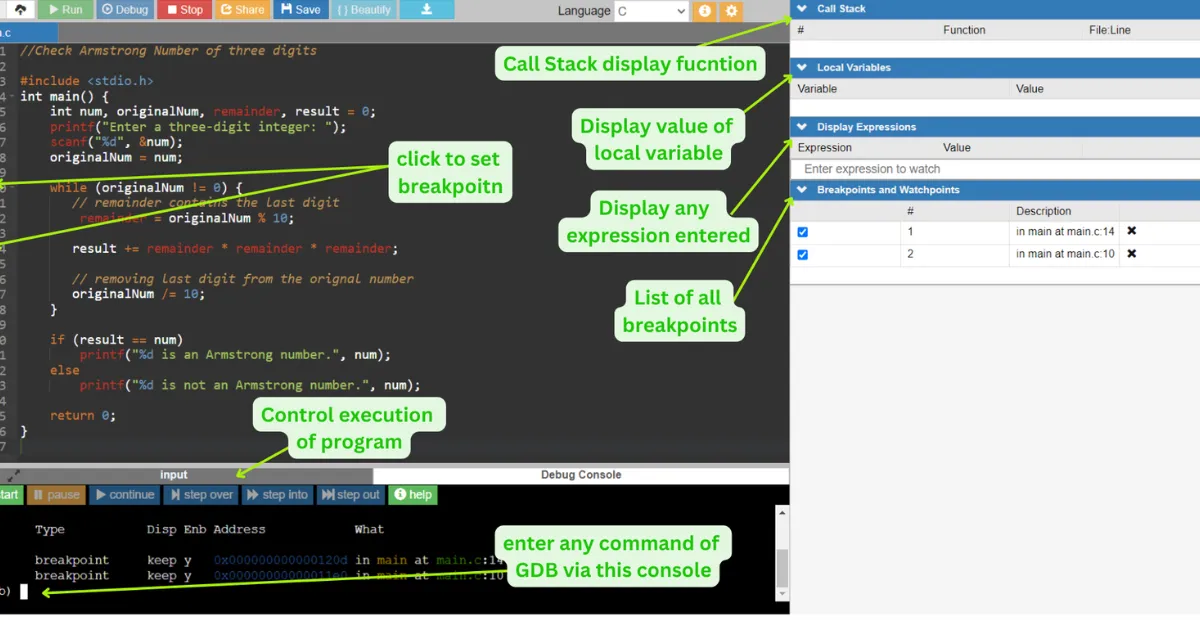In the evolving landscape of software development, tools that offer flexibility and efficiency are paramount. Online GDB stands out as a versatile online compiler and debugger, providing developers with the ability to write, compile, and debug code directly from their browsers. Supporting a myriad of programming languages, Online GDB eliminates the need for local installations, making it an invaluable resource for both novice and experienced programmers.
What is Online GDB?
Online GDB is a web-based integrated development environment (IDE) that facilitates coding and debugging without the constraints of traditional setups. By leveraging the GNU Debugger (GDB), it offers a robust platform for developers to test and refine their code in real-time.
Key Features:
-
Multi-language Support: C, C++, Java, Python, and more.
-
Integrated Debugger: Set breakpoints, step through code, and inspect variables seamlessly.
-
User-friendly Interface: Intuitive design catering to both beginners and professionals.
-
Collaboration Tools: Share code snippets and collaborate in real-time.
Getting Started with Online GDB
Embarking on your coding journey with Online GDB is straightforward
-
Access the Platform: Navigate to Online GDB.
-
Select Your Language: Choose from the dropdown menu the programming language you intend to use.
-
Write Your Code: Utilize the editor to input your code.
-
Compile and Run: Click on the “Run” button to compile and execute your program.
-
Debugging: Use the “Debug” feature to set breakpoints and step through your code for thorough analysis.
Advantages of Using Online GDB
1. Accessibility
Being browser-based, Online GDB allows developers to work from any device with internet connectivity, eliminating the need for specific hardware or software installations.
2. Versatility
With support for multiple programming languages, it caters to a broad spectrum of development needs, from simple scripts to complex applications.
3. Educational Tool
For educators and students, Online GDB serves as an excellent platform for teaching and learning programming concepts, offering immediate feedback and interactive debugging.
4. Collaboration
The ability to share code snippets and collaborate in real-time enhances team productivity and facilitates peer reviews and pair programming sessions.
Benefits of Using an Online GDB Compiler
Online GDB compilers have transformed debugging code. These tools let you compile and debug code from your browser. So, you can work from anywhere on various devices without installing software.
- No installation is necessary: You can debug in the browser without installing GDB locally.
- Collaborate instantly: Share code and debug with others in real time.
- Use extra tools: Speed up debugging with syntax highlighting and code completion. Project management tools are helpful, too.
You can exchange and debug code using a GDB compiler, like Online GDB, JDoodle, or Ideone. This allows for better, seamless collaboration. Also, many compilers support many languages. You can debug different codes in the same environment.
Popular Online GDB Compilers

To ensure an online GDB compiler meets your needs, check its features. Here are some well-liked choices:
| Compiler | Supported Languages | Key Features |
| Online GDB |
|
Breakpoints, variable watches, auto code completion |
| JDoodle |
|
Save and share code, simple interface |
| Ideone |
|
Sandbox environment, optimize code, custom flags |
| Compiler Explorer |
|
Real-time code editing and assembly output exploration |
Choose a suitable compiler. Check its features, like language support and collaborative debugging.
Effective Tips for Debugging with Online GDB Compilers
If you’re using an online GDB C compiler, this advice will help you debug your code more efficiently.
- Launch with GDB Arguments: Use “gdb –args” to feed the arguments directly into your program if it needs them.
- Use Print Statements: Use print to check variables while troubleshooting.
- Enable Pretty Printing: To improve visibility, enable pretty printing for huge arrays.
Best Practices and Strategies
Debugging C programs has specific challenges. However, there are ways to fix issues like memory leaks, segmentation errors, or threading problems.
Common Debugging Techniques:
Isolate errors by disabling code sections in a systematic manner. Place print statements in key locations to track variables. Use memory analysis tools like GDB and Valgrind to pinpoint issues. These techniques diagnose problems on time. They reveal the root cause of program bugs. Systematic debugging leads to quicker solutions and improved code quality.
Multithreaded programs also need special consideration. Use GDB to debug individual threads or processes. It helps find concurrency problems, like race conditions, in complex programs.
Memory Issues and Leaks in Online GDB Compilers
In C programming, memory management is crucial. It often causes errors, like crashes or leaks. GDB enables you to look at memory while it’s running and find mistakes or leaks. Use instructions to check memory addresses, study structures, or print pointers. Do this to troubleshoot.
Handling Memory Errors:
- Use GDB to examine memory dumps for identifying leaks.
- Leverage Valgrind to detect memory leaks and improper memory access.
Additional Resources:
- CS50x Lecture by David J. Malan: Ideal for GDB beginners.
- GDB Documentation: The go-to manual for advanced users.
- The Art of Debugging: A thorough guide to GDB debugging.
These tools help developers tackle tough tasks.
Conclusion
Online GDB emerges as a powerful tool in the realm of online development environments, offering a blend of accessibility, versatility, and collaborative features. Whether you’re a student, educator, or professional developer, it provides a convenient platform to write, test, and debug code efficiently. By understanding its features and limitations, users can effectively integrate It into their development workflows, enhancing productivity and fostering innovation.
Read Our More Blogs…..
